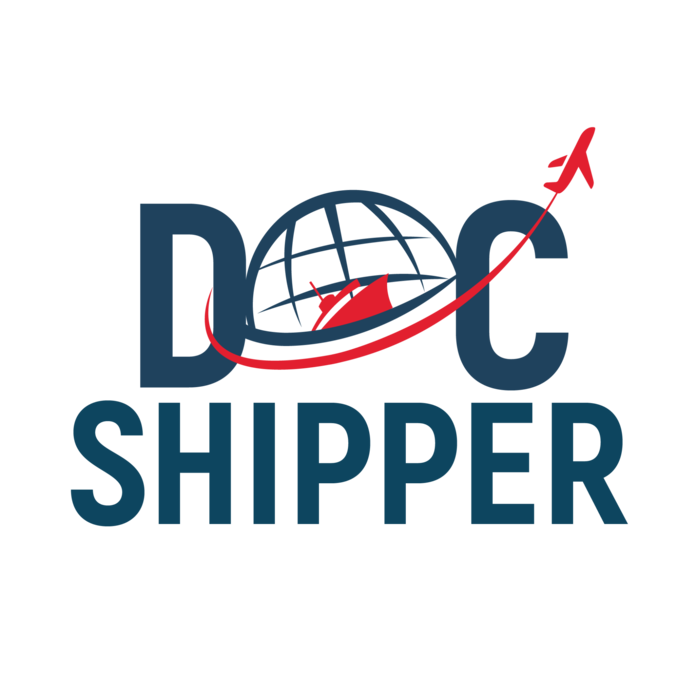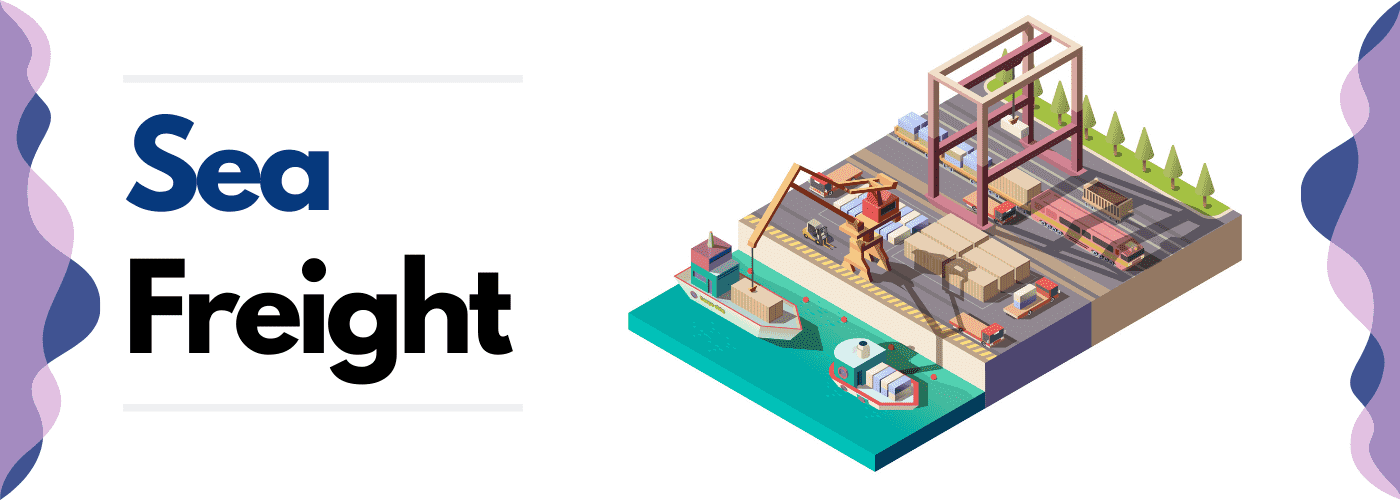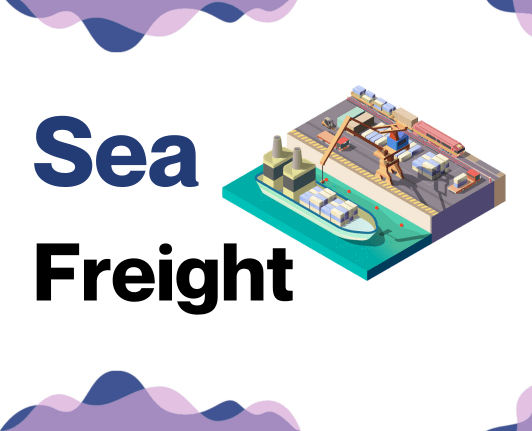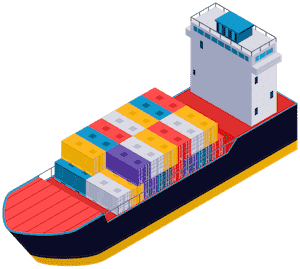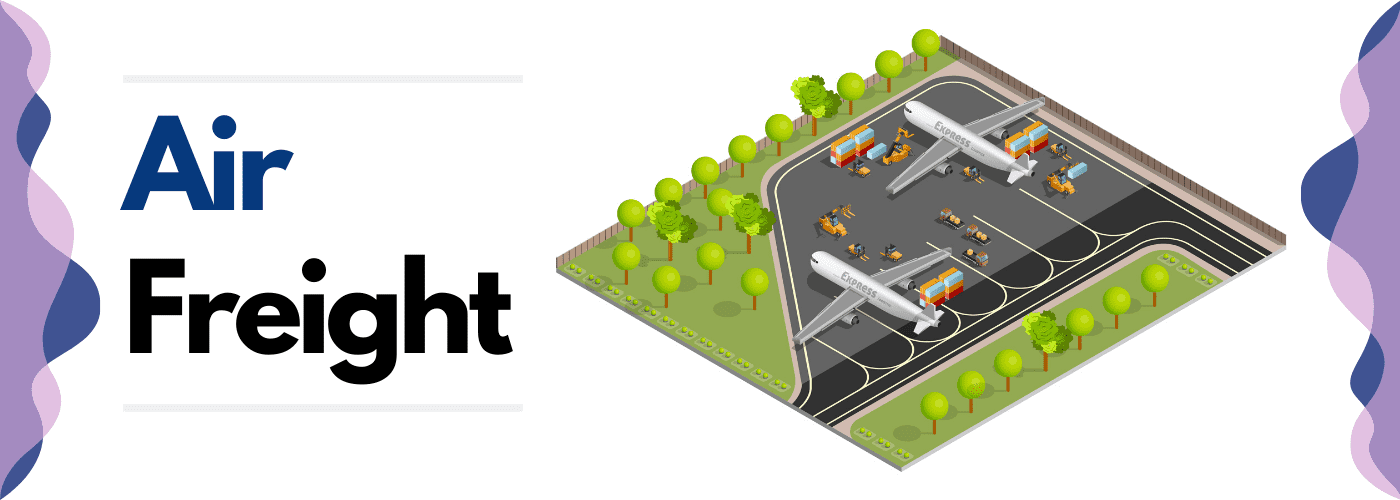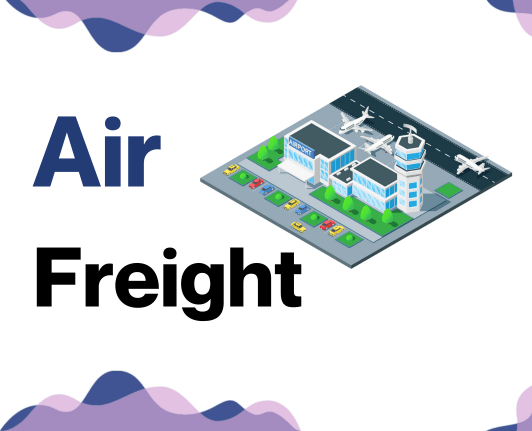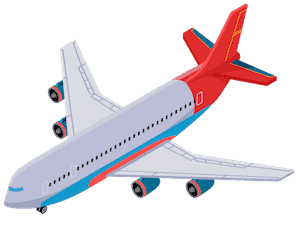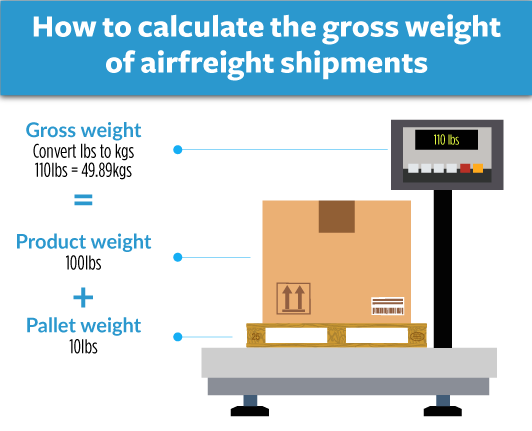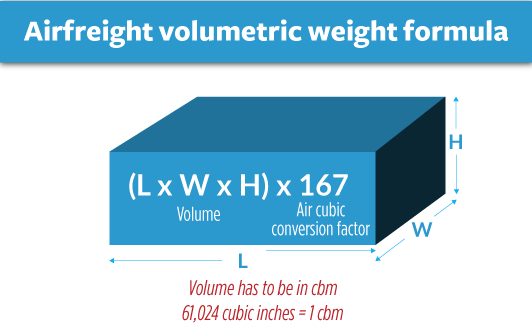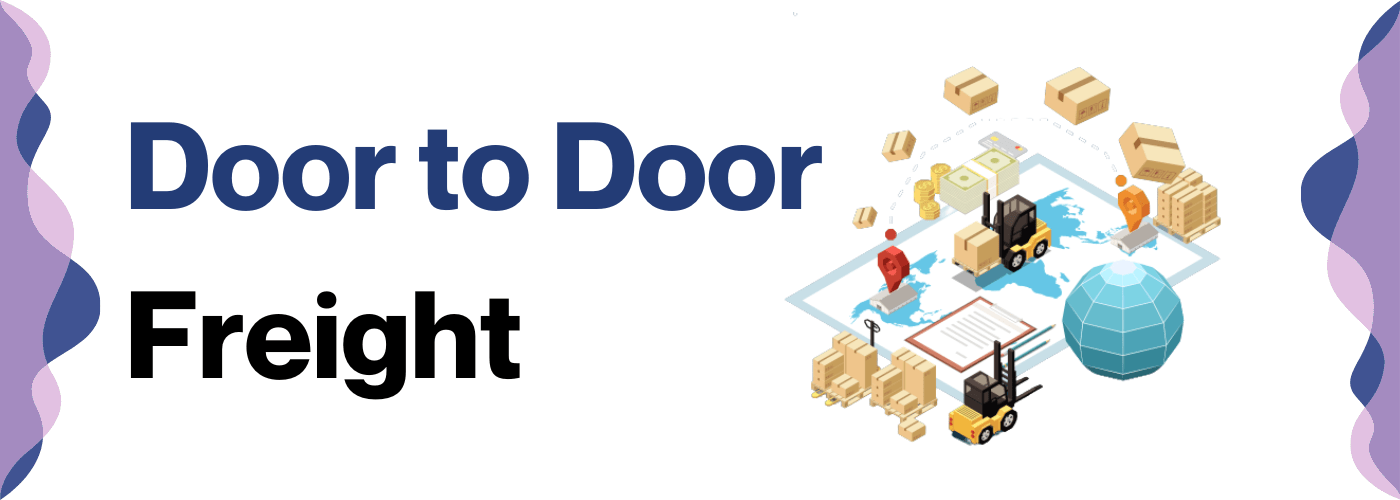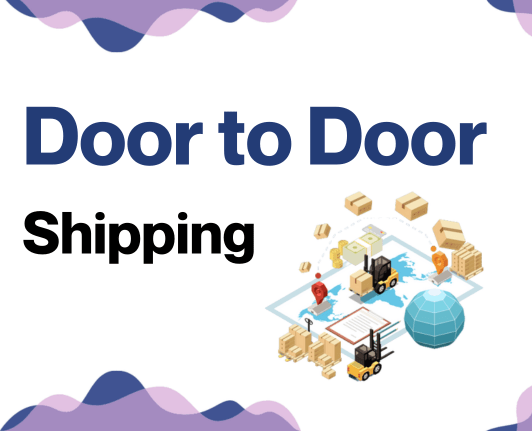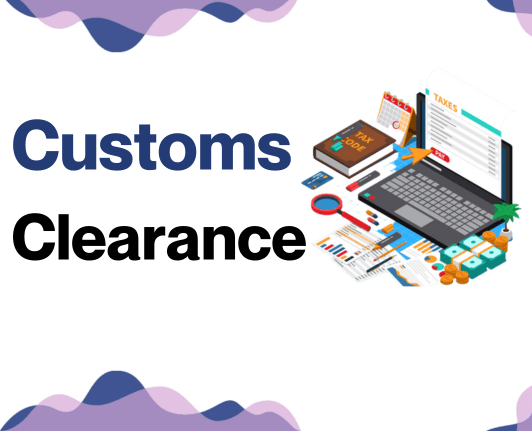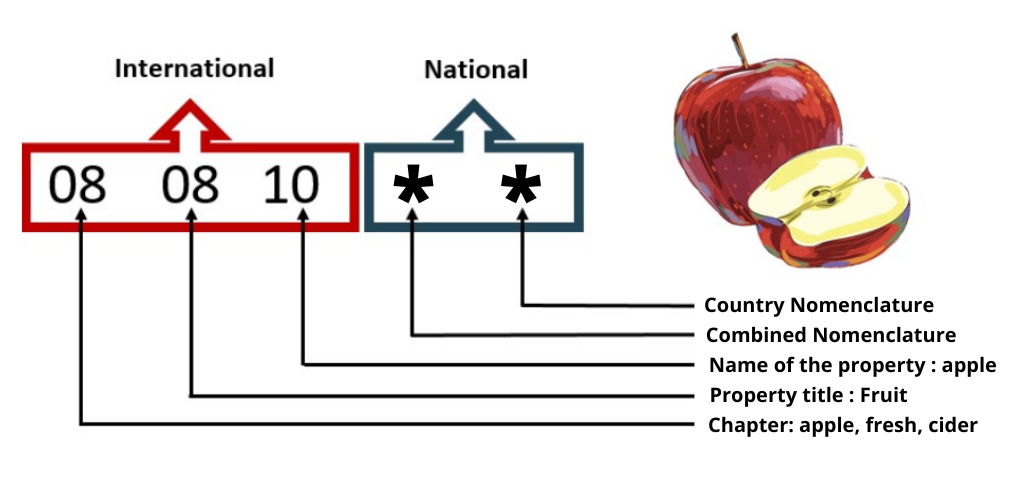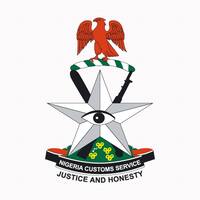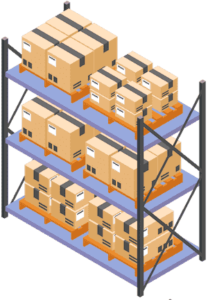Why did the freight get shipped from the US to Nigeria? To break some borders, not jokes! In the not-so-funny world of international shipping, businesses often wrestle with fluctuating rates, elusive transit times, and cryptic customs regulations. This guide serves as your nautical compass in these choppy shipping waters.
Peep under the lid of freight options to Nigeria, unravel the spaghetti-like complexity of customs clearance, decode the formula behind duties and taxes, and scoop up practical advice tailored for businesses.
If the process still feels overwhelming, let DocShipper handle it for you! As an end-to-end service provider, we turn your shipping challenges into success stories, chiseling your path in every step of the process.
Table of Contents
ToggleWhich are the different modes of transportation between US and Nigeria?
Choosing the right transport method to ship your goods from the US to Nigeria is like picking the quickest route in a marathon - it significantly impacts your timing and results. Despite the Atlantic Ocean between them, a world of shipping options lies open.
The geographical puzzle isn't a problem if you choose the best pieces - perhaps an airplane soaring above, or a cargo ship deftly navigating the waterways. This decision shapes not only your shipping time but also costs and procedures. Dive in to discover the smoothest shipping journey for your goods across the miles.
How can DocShipper help?
Looking for smooth shipping between the US and Nigeria? At DocShipper, we simplify this journey for you. Our experts tackle all logistics, from transport to customs clearance, swiftly and efficiently. Want a hassle-free shipping experience? Reach out to us for a free price estimate in less than 24 hours. Got queries? Call our consultants – it's free!
DocShipper Tip: Sea freight might be the best solution for you if:
- You are shipping large volumes or bulky items, as sea freight offers the most space at a cost-effective rate.
- Your cargo doesn't have an urgent deadline, as sea freight typically has longer transit times compared to air or rail.
- Your shipping routes are between major ports, allowing you to leverage the extensive global network of sea shipping lanes.
Sea freight between US and Nigeria
Ocean shipping establishes a vivid trade web between US and Nigeria, weaving together their key industrial centers via bustling cargo seaports. Los Angeles and New York in the US uniquely interlink with Lagos and Calabar ports in Nigeria, cementing a cost-effective pathway for shipping high-volume goods.
However, the comfort of cost-effectiveness might hit a snag on the slow sea lanes, a trade-off shippers understand well.
Stepping into the racetrack of US-Nigeria shipping can feel like entering a labyrinth for many businesses. The multitude of rules, looming pitfalls of errors, and intricate paperwork could make it seem like navigating a dense jungle. Yet, hidden beneath these woes are troves of best practices and shipping panaceas that decode the complexity.
In this guide, we simplify this journey by underscoring the essentials of successful shipping. Think of it as a detailed map that leads you safely through the shipping terrain, ensuring a smoother voyage for your cargo.
Main shipping ports in US
Port of Los Angeles
Location and Volume: Located in San Pedro Bay, 20 miles south of downtown Los Angeles, this bustling port boasts a shipping volume of 9.5 million TEU.
Key Trading Partners and Strategic Importance: Engaging in trade relations primarily with East Asia, the Port of Los Angeles holds the title of America's top port by container volume and cargo value, providing high-volume access to major markets and suppliers.
Context for Businesses: If you're looking to tap into the Asian markets, the Port of Los Angeles may be a central component of your logistics strategy, given its high-volume throughput and direct transit connections to Asia.
Port of New York and New Jersey
Location and Volume: Stretching across the Hudson River, this port encompasses a shipping volume of approximately 7.3 million TEU.
Key Trading Partners and Strategic Importance: It’s a key exchange point for goods, primarily with Europe and East Asia. As the largest and busiest port on the East Coast, it's central to the trade network of the North Atlantic.
Context for Businesses: Firms interested in reaching markets in Europe and the northeastern US should consider the Port of New York and New Jersey due to its vast network and extensive facilities.
Port of Savannah
Location and Volume: Located on the Savannah River in Georgia, it has a shipping volume of about 4.6 million TEU.
Key Trading Partners and Strategic Importance: The port primarily trades with Central and South America. As the fastest-growing and fourth-largest port in the US, its geographical location allows direct service to the US Southeast and Midwest.
Context for Businesses: Those eyeing expansion in Central or South American markets might heavily rely on Port of Savannah, coupled with its intermodal efficiencies and fast transit times.
Port of Houston
Location and Volume: Nestled in the Gulf of Mexico, this port deals with a shipping volume of close to 2.9 million TEU.
Key Trading Partners and Strategic Importance: Large volumes of trade take place with East Asia and Europe, and it is a fulcrum for petrochemical goods given Houston's oil industry.
Context for Businesses: If your business strategy includes distributing petrochemical goods to Asian or European markets, the Port of Houston could play a significant role due to its superior logistics infrastructure.
Port of Seattle
Location and Volume: Located on the US West Coast, the port handles a shipping volume of 1.6 million TEU.
Key Trading Partners and Strategic Importance: Key alliances primarily rest with East Asia and Alaska. The port’s maritime activities support both cargo and passenger intake, contributing to local economic growth.
Context for Businesses: If you're considering serving the Pacific Northwest, Alaskan or Asian markets, the Port of Seattle's diverse cargo and passenger capabilities may align well with your business objectives.
Port of Tacoma
Location and Volume: Found in the Puget Sound of Washington state, this port deals with a shipping volume of around 2.1 million TEU.
Key Trading Partners and Strategic Importance: Active trading relationships primarily involve East Asia and Alaska. As the closest U.S. port to major ports in Asia, it provides shorter transit times.
Context for Businesses: For businesses aiming to expedite Asian trade or strengthen connections in the Pacific Northwest, the Port of Tacoma serves as a strategic logistics hub due to its geographic advantage and efficient operations.
Main shipping ports in Nigeria
Apapa Port
Location and Volume: Located in Lagos, this port is a gateway to many West African countries, with a shipping volume of approximately 1 million TEUs annually.
Key Trading Partners and Strategic Importance: Apapa Port is strategically important in the import and export of goods with Europe, Asia, and America, and it's a significant player in Nigeria's oil sector exports.
Context for Businesses: If you're looking to tap into the West African market, Apapa Port’s vast network and high shipping volume could be an integral part of your international shipping strategy.
Tin Can Island Port
Location and Volume: This port is also situated in Lagos and sits second only to Apapa in Nigeria in terms of volume, with an annual throughput of about 800,000 TEUs.
Key Trading Partners and Strategic Importance: Tin Can Island Port is critical for Nigeria's trade relationships, especially with European and Asian nations, and it's predominantly involved in oil and agricultural goods.
Context for Businesses: For businesses aiming to enter the Nigerian market, particularly in the petroleum sector, Tin Can Island Port provides formidable access and opportunities.
Calabar Port
Location and Volume: Located in the South-Eastern part of Nigeria, Calabar Port mainly accommodates smaller vessels due to its shallower waters, handling around 100,000 TEUs annually.
Key Trading Partners and Strategic Importance: Despite its relatively smaller size, Calabar Port remains a key player with African and European trade dealings, specifically in natural resources.
Context for Businesses: If you're looking to connect with smaller local markets and can work with smaller-sized shipments, Calabar Port may offer profitable networking opportunities.
Delta Port
Location and Volume: Set in the Southern part of Nigeria, Delta Port handles a moderate volume of about 300,000 TEUs per year.
Key Trading Partners and Strategic Importance: It has notable engagements with European partners, mainly dealing in petroleum, metal ores, and agricultural products.
Context for Businesses: For businesses considering venturing into the Nigerian oil or agriculture industry, Delta Port may be a good launching point for operations.
Rivers Port
Location and Volume: Nestled in the heart of the city of Port Harcourt, Rivers Port has an annual handling of around 400,000 TEUs.
Key Trading Partners and Strategic Importance: Rivers Port is known for its strong connections with Asian and American economies, primarily dealing in petroleum, agriculture, and manufacturing products.
Context for Businesses: Firms looking to connect to urban centers, especially those dealing with manufacturing goods, might find Rivers Port an optimal point for distribution.
Onne Port
Location and Volume: Located in the Southern area of Nigeria, Onne Port is focused mostly on oil and gas freights, handling over 600,000 TEUs per year.
Key Trading Partners and Strategic Importance: Its trade network extensively covers Europe, making it a vital contributor to Nigeria's oil sector.
Context for Businesses: If you're planning to penetrate the oil and gas industry in Europe, Onne Port could form a critical link in your logistics chain due to its significant oil exports.
Should I choose FCL or LCL when shipping between US and Nigeria?
Choosing the perfect sea freight option between US and Nigeria - FCL (Full Container Load) or LCL (Less than Container Load), aka consolidation - can seem like a daunting task.
But, the decision you make has the power to streamline costs, deliver on time, and drive the success rate of your shipping operation sky-high! Ready to dive deep into an ocean of information to tailor a shipping strategy to your needs? Let's get started!
LCL: Less than Container Load
Definition: Less Than Container Load (LCL) shipping is an option where your cargo shares container space with others', reducing cost since you're only paying for the portion you occupy.
When to Use: LCL is better suited for shipping goods that don't take up much space (around 13/14/15 CBM or less). This makes the service particularly attractive for businesses shipping smaller amounts, providing price flexibility.
Example: If you're shipping a variety of canned foods from a manufacturer in Ohio to a grocery store in Lagos, but your cargo only totals 12 CBM, choosing lcl shipment can save costs as your freight will share the ocean container with other shippers.
Cost Implications: LCL freight can be more cost-effective for smaller shipments, unlike Full Container Load (FCL) where you pay for the whole container. LCL lessens the financial burden by allowing you to pay for only the space you use. However, keep in mind that you may face additional handling charges due to consolidated shipments being unpacked at the destination port.
FCL: Full Container Load
Definition: FCL, or Full Container Load, is an option in freight shipping where a shipment takes up an entire container. This type of shipment is called 'fcl shipping'. It’s typically cheaper for high-volume goods and provides safety since the container is sealed from origin to destination.
When to Use: FCL is suitable when the cargo measures more than 13/14/15 CBM. This choice becomes more cost-effective as the 'fcl shipping quote', understandably, does not increase significantly with the volume of goods.
Example: For instance, a manufacturer shipping 15 CBM of machinery parts to Nigeria from the US could opt for an 'fcl container'. They might choose a '20'ft container' or a '40'ft container' depending on their cargo size. This way, they assure the safety of their goods since no other shipments are included in the same space.
Cost Implications: Cost-wise, though the initial 'fcl shipping quote' might be higher than Less than Container Load (LCL), you'll likely have lower costs per unit shipped with an FCL - especially with higher volumes. Also, the absence of extra handling associated with LCL means reduced risk of damages, potentially saving you more in the long run.
Unlock hassle-free shipping
Streamline your shipping process with DocShipper, your go-to international freight forwarder. We're committed to simplifying cargo shipping regardless of container size. Our ocean freight experts clarify the complex, considering factors such as shipment size, cost, and transit time. Trust us to guide you to the most effective solution between full container or consolidation when shipping from the US to Nigeria. Ready to unlock a hassle-free shipping experience? Get in touch for a free, no-obligation estimate today.
How long does sea freight take between US and Nigeria?
The typical sea freight transit time from the US to Nigeria can range widely, with an average duration of around 4-6 weeks. However, actual transit times may differ based on factors such as the specific ports used, the weight of the cargo, and the nature of the goods transported.
Given the complexities involved, it's best to reach out to freight forwarders like DocShipper for a precise and tailored quotation.
Average Sea Freight Transit Times :
| US Port | Nigerian Port | Average transit time (days) |
| Los Angeles | Apapa | 34 |
| Houston | Apapa | 28 |
| Newark | Apapa | 28 |
| Savannah | Apapa | 30 |
*Please note these are estimated transit times and the actual timing can differ. Always consult with a reliable freight forwarder to plan your shipment.
How much does it cost to ship a container between US and Nigeria?
Estimating the cost to ship a container from the US to Nigeria is somewhat complex, as rates can vary widely due to multiple factors. The shipping cost per CBM could range from a few hundred to thousands of dollars. Factors such as Point of Loading, Point of Destination, the carrier used, nature of goods, and monthly market fluctuations in ocean freight rates can all influence the final cost.
As an international freight forwarder, we understand these intricacies and work closely with our clients to provide the best possible rates. Rather than offering a one-size-fits-all price, we quote each shipment individually, crafting tailor-made solutions for your unique shipping needs. Rest assured, our experts are here to guide you in this endeavour.
Special transportation services
Out of Gauge (OOG) Container
Definition: OOG container, or Out of Gauge container, refers to a special shipping method used for cargo that exceed the dimensions of standard shipping containers.
Suitable for: Transporting large and heavy equipment such as industrial machinery, construction materials, and vehicle parts.
Examples: Turbine parts, large pipes, excavators, and tractors.
Why it might be the best choice for you: If your business deals with large, heavy, or unusually shaped equipment, using OOG is the most reliable mode of sea freight.
Break Bulk
Definition: Break Bulk refers to goods that must be loaded individually, and not in shipping containers. These are known as loose cargo load.
Suitable for: Shipping items that are oversized, heavy, or both, and that can't fit into a standard container.
Examples: Large construction materials like beams, heavy machinery, and steel coils.
Why it might be the best choice for you: If you're dealing with individually loaded items which are too big or heavy to be loaded into conventional containers, opting for break bulk shipping can be advantageous.
Dry Bulk
Definition: Dry bulk shipping involves the transportation of homogeneous goods in large quantities, such as minerals or grains, directly loaded into the ship's hold.
Suitable for: Shipping raw materials like coal, iron ore or grains.
Examples: Grain, coal, iron ore, construction materials like sand and gravel.
Why it might be the best choice for you: If you need to move large quantities of unprocessed materials, dry bulk shipping can offer cost-effective solutions.
Roll-on/Roll-off (Ro-Ro)
Definition: Roll-on/Roll-off shipping involves vehicles being driven on and off a specially designed Ro-Ro vessel.
Suitable for: Transporting self-propelled, towable or mobile machinery.
Examples: Cars, buses, trucks, trailers, and heavy machinery like cranes.
Why it might be the best choice for you: If your cargo can be rolled, such as cars, trucks, trailers, or wheel-based machinery, Ro-Ro shipping provides an efficient and fast shipping method.
Reefer Containers
Definition: Reefer containers are refrigerated containers for shipping temperature-sensitive goods.
Suitable for: Perishable goods, temperature-controlled food products, and pharmaceuticals.
Examples: Fruits, vegetables, dairy products, meats, and pharmaceuticals that require a controlled temperature.
Why it might be the best choice for you: If you're trading in goods that need to be kept at a specific temperature during transit, Reefer Containers can offer the optimum conditions to ensure your cargo arrives in perfect condition.
At DocShipper, we understand that every business has unique shipping needs. Whether you need to ship outsized industrial machinery or temperature-controlled food products, we're here to help. Contact us for a free shipping quote within less than 24 hours, and let us take the complexity and headache out of international shipping for you.
DocShipper Tip: Air freight might be the best solution for you if:
- You are in a hurry or have a strict deadline requirement, as air freight offers the fastest transit times.
- Your cargo is less than 2 CBM (Cubic Meter), making it more suitable for smaller shipments.
- Your shipment needs to reach a destination that is not easily accessible by sea or rail, allowing you to tap into the extensive network of global airports.
Air freight between US and Nigeria
When shipping between the US and Nigeria, air freight leaps forth as a swift, reliable linchpin. Think about it as the express mail of international trade – perfect for small but high-value shipments, like luxury watches or state-of-the-art electronics. It's like turning on the turbo boost in a video game, ensuring your goods are delivered quickly and safely, often in less than a week.
But, hang on a minute – there's a game of Tetris at play. Oftentimes, shippers underestimate the complexities of air freight – not using the correct weight formula when estimating the price, or unknowingly slipping on best practices.
These missteps aren't simply toe stubbers, but can inflate your shipping costs massively – kind of like buying a meal deal but forgetting to take the drink. This section will guide you safely, avoiding such pitfalls to maximize your air freight experience.
Air Cargo vs Express Air Freight: How should I ship?
Looking to expedite shipping between the US and Nigeria, but torn between Air Cargo and Express Air Freight? Casual terms explained - think of Air Cargo as hitching a ride in a commercial airline's baggage hold, while Express Air Freight is more like chartering your own dedicated plane. Stay tuned as we delve into the specifics of each to ensure your business chooses the optimal way to transport goods.
Should I choose Air Cargo between US and Nigeria?
Choosing air cargo for shipping from the US to Nigeria could be a sound decision, especially for consignments above 100/150 kg (220/330 lbs). It provides a cost-effective and reliable service ranking high among worldwide routes. Airlines like United Airlines and Arik Air lead the market in this sphere, have fixed schedules and longer transit times.
Your business might consider this option should you have budgetary needs that align with isn't bound by strict delivery times.
Should I choose Express Air Freight between US and Nigeria?
Express air freight is a service dedicated to transporting goods quickly by using cargo-only aircraft. If you intend to ship less than 1 cubic meter or between 100-150 kg (220-330 lbs) of goods, this may be your ideal choice.
The swift nature of renowned courier firms such as FedEx, UPS, and DHL ensures your cargo reaches Nigeria from the US within a short span. Opt for this if speed is a priority, giving you less handling, faster clearance, and a reduced chance for damage or loss.
Main international airports in US
Los Angeles International Airport (LAX)
Cargo Volume: LAX handles over 2 million tons of cargo annually, making it one of the busiest in the world.
Key Trading Partners: It handles goods from Asia, especially China, Japan, and South Korea, among many others.
Strategic Importance: Sitting adjacent to North America's West Coast, LAX plays a pivotal role in trans-Pacific trade, serving as the first point of entry for Asian goods bound for US markets.
Notable Features: LAX offers a dedicated cargo center, capable of handling various types of goods, including perishable, pharmaceuticals, and heavy equipment.
For Your Business: LAX's efficient handling of high-volume freight and broad network of trade partners makes it an advantageous hub for businesses trading with Asia.
John F. Kennedy International Airport (JFK)
Cargo Volume: JFK handles over 1.6 million tons of cargo every year.
Key Trading Partners: It maintains trading relations with Europe, Asia, and South America, among others.
Strategic Importance: Situated on the East Coast, JFK serves as a primary cargo gateway between the US and international markets.
Notable Features: JFK provides high-security warehousing facilities for precious goods, alongside robust infrastructure to handle large-capacity cargo aircraft.
For Your Business: If your enterprise deals with high-value goods and has trading partners in Europe or South America, JFK's cargo handling capabilities can be integral to your shipping strategy.
Chicago O’Hare International Airport (ORD)
Cargo Volume: ORD handles more than 1.9 million tons of cargo annually.
Key Trading Partners: It has significant trade partnerships with Asia, Europe, and South America.
Strategic Importance: Given its central location, ORD is a crucial logistics hub for the US, linking both coasts and facilitating cargo flows between them.
Notable Features: ORD boasts a new Northeast Cargo Center, enhancing its cargo-handling capacity.
For Your Business: ORD's strategic location and robust infrastructure make it an optimal choice for businesses with diverse international trading operations.
Miami International Airport (MIA)
Cargo Volume: MIA manages over 2 million tons of cargo yearly.
Key Trading Partners: It is the primary airport for trade between the US and Latin America.
Strategic Importance: Based in Southeast Florida, MIA serves as a cargo doorway to the Southern Hemisphere.
Notable Features: MIA is home to the largest concentration of international freight forwarders and customs brokers in the US.
For Your Business: If your business maintains a strong trade relationship with Latin America, MIA's connectivity and expansive freight forwarder network could be vital to your shipping plan.
Memphis International Airport (MEM)
Cargo Volume: MEM is the busiest cargo airport in the world by volume, handling over 4.3 million tons of cargo annually.
Key Trading Partners: Its key partners span locations worldwide due to its current status as a global cargo hub.
Strategic Importance: The central location designates MEM as a principal air cargo nucleus for the US.
Notable Features: MEM is the central global hub for FedEx, accounting for the formidable amount of cargo that flows through this airport.
For Your Business: Given its status as a global cargo gateway, MEM can play a powerful role in your shipping strategy, particularly if your activities are heavily reliant on express or overnight deliveries.
Main international airports in Nigeria
Murtala Muhammed International Airport
Cargo Volume: Handles more than 170,000 metric tons of cargo annually.
Key Trading Partners: China, the United States, UK, India, and Brazil are the key trading partners.
Strategic Importance: Being the busiest airport in Nigeria, it plays a critical role in the country's import and export business.
Notable Features: Equipped with modern cargo handling facilities, catering to both perishable and non-perishable goods.
For Your Business: If you're looking for the air freight hub of Nigeria, this should be your primary consideration given its high cargo volumes, advanced facilities, and extensive global links.
Nnamdi Azikiwe International Airport
Cargo Volume: Handles over 18,000 metric tons of cargo annually.
Key Trading Partners: Major trading partners include the United States, China, and European countries.
Strategic Importance: As the second busiest airport in Nigeria, it provides a crucial gateway to the country's capital, Abuja.
Notable Features: The airport recently underwent a major upgrade, further enhancing its cargo handling capabilities.
For Your Business: If you need access to the political heavyweight city of Abuja, this airport is of great relevance. Its modern facilities can help streamline your logistics operations.
Mallam Aminu Kano International Airport
Cargo Volume: Approximately 12,000 metric tons handled annually.
Key Trading Partners: Primarily Saudi Arabia, due to the airport's primary function as a hub for pilgrims.
Strategic Importance: Noted for accommodating cargo flights, especially during the Hajj season.
Notable Features: Known for its wide tarmac that accommodates larger planes equipped to handle bulky cargo.
For Your Business: This is a prime choice if timed around religious pilgrimage dates. This leads to an increase in services and capacity that your business can take advantage of.
Port Harcourt International Airport
Cargo Volume: Approximately 6,500 metric tons per annum.
Key Trading Partners: Predominantly countries in West Africa and Europe.
Strategic Importance: Major gateway for the southern part of Nigeria, particular focus on oil and gas sector.
Notable Features: Port Harcourt airport is capable of handling large cargo aircraft, including shipments related to the petroleum industry.
For Your Business: If your shipping needs revolve around Oil and Gas related cargo, this airport can be strategically crucial to your operations.
Akanu Ibiam International Airport
Cargo Volume: Data Not Available.
Key Trading Partners: Mainly trades with countries in West Africa and Europe.
Strategic Importance: Provides an essential gateway to South Eastern part of Nigeria.
Notable Features: Recently equipped with a new terminal and expanded runway which allows for increased cargo traffic.
For Your Business: Offers a strategic entry point to South Eastern Nigeria with improved infrastructure. Ideal for businesses targeting this geographical area.
How long does air freight take between US and Nigeria?
When shipping goods from the US to Nigeria via air freight, the average transit time typically ranges between 5 to 8 days.
However, this can vary depending on factors such as the specific airports of origin and destination, the weight of the cargo, and the nature of the goods being shipped.
For accurate and tailored shipping durations, it's recommended to consult with a freight forwarder like DocShipper.
How much does it cost to ship a parcel between US and Nigeria with air freight?
Shipping air freight parcels between the US and Nigeria typically costs around $3-10 per kilogram. However, it's important to understand this is a rough estimate. Actual charges can vary based on factors such as distance to airports, parcel dimensions, weight, and type of goods.
Without these details, providing an exact quote becomes complex. Rest assured, our dedicated team is ready to work closely with you, offering competitive rates tailored to your specific shipping needs. We quote on a case-by-case basis to ensure you get the best value. Contact us today and receive a free quote in under 24 hours.
What is the difference between volumetric and gross weight?
Gross weight represents the actual weight of your shipment, including packaging and pallets. Simply, it's the total weight you'd see if you put your package on a scale. Volumetric weight, however, is a value derived from the total volume that your shipment occupies. This is not necessarily linked to the physical weight but instead considers the space it takes up on an aircraft.
In Air cargo, you calculate the volumetric weight by multiplying the length, width, and height (in cm) of your package and dividing by 6000. Let's illustrate this with an example. Assume you have a package measuring 40cm x 30cm x 20cm. The volumetric weight would be (403020)/6000 = 4 Kgs or 8.82 lbs.
Now in Express Air Freight, this calculation is bit different. Here we use a standard divisor of 5000 instead of 6000. Now consider the same package dimensions, the volumetric weight would be (403020)/5000 = 4.8 Kgs or 10.58 lbs.
The gross weight versus volumetric weight calculation is critical because it impacts your shipment cost. Freight charges are determined based on whichever is higher between the two. Therefore, incorrectly estimating either could lead to miscalculations in your shipping budget. This knowledge helps you manage your shipping costs effectively.
DocShipper tip: Door to Door might be the best solution for you if:
- You value convenience and want a seamless shipping process, as door-to-door takes care of every step from pickup to delivery.
- You prefer a single point of contact, as door-to-door services typically provide a dedicated agent to handle all aspects of the shipment.
- You want to minimize the handling of your goods, reducing the risk of damage or loss, as door-to-door minimizes transitions between different modes of transport.
Door to door between US and Nigeria
Door to Door shipping bridges the gap between the U.S. and Nigeria, promising a seamless transport of your goods right from the origin to the destined threshold.
It's a no-fuss, efficient method that eliminates the need for multi-step freight management.
So, are you ready to unravel the pros of this all-inclusive shipping solution that's literally tailor-made for your ease? Let's dive in!
Overview – Door to Door
Shipments from the US to Nigeria demand serious logistics prowess. More businesses prefer Door-to-Door shipping due to its convenience and stress-free nature. This sought-after service from DocShipper simplifies the complex shipping maze for you.
You can sidestep challenges like customs compliance and monitoring transportation stages, focusing your time and energy on business growth.
However, it's pricier than other methods and transit times may vary. Be assured though, it's worth the benefits of a hustle-free shipping journey. If you're facing shipping woes, Door-to-Door could be your match!
Why should I use a Door to Door service between US and Nigeria?
Balancing a shipload of logistics while juggling a hot coffee? Let's not - we'd hate for you to spill! Here's why you should consider door-to-door service for your shipment from the US to Nigeria.
- Stress-Free Logistics: Door-to-door service means we handle everything - from picking up your goods to delivering them at their final destination. You can hang up your logistics hat and focus on what you do best.
- Timely Delivery: When your shipment is urgent, every minute matters. With door-to-door service, there are no delays in transit hubs, ensuring quick delivery.
- Specialized Care for Complex Cargo: Got something a little trickier to transport? No problem! Door-to-door service provides specialized logistics for complex, delicate, or high-value goods.
- Complete Oversight: With door-to-door service, you've got a team dedicated to your shipment's progress. We manage all the administrative work from customs clearance to local trucking, so you’re always in the know.
- Convenience: Lastly, but certainly not least, door-to-door service offers unparalleled convenience. No more running around to various drop-off points - we got you covered!
So why not sit back, sip that hot coffee, and leave the heavy lifting to us? Your goods are in safe hands from sea to shining sea or wherever else they might be headed.
DocShipper – Door to Door specialist between US and Nigeria
Experience stress-free door-to-door shipping from the US to Nigeria with DocShipper. Trust us to seamlessly manage all transportation logistics, from packaging to customs formalities, across all shipping modes.
Enjoy personalized services with a dedicated Account Executive, ensuring smooth and hassle-free transport of goods.
Need to ship out soon? Get a free cost estimate in under 24 hours or reach out to our expert consultants for free advice today. Leave the logistics to us, so you can focus on what's important - your business. Enjoy peace of mind with DocShipper!
Customs clearance in Nigeria for goods imported from US
Customs clearance is the bureaucratic hurdle your goods jump from the US to Nigeria, an intricate dance of duties, taxes, quotas, and licenses. Navigating this labyrinth can be daunting, riddled with unexpected fees and the risk of your goods languishing in limbo.
Getting a solid grip on these processes is vital, but fear not, our upcoming sections will be your guide. And remember, DocShipper has got your back, offering all-inclusive assistance for any type of goods worldwide. Just share the origin, value, and HS Code of your goods for a precise project estimate. So, buckle up and absorb this knowledge to pave a smooth customs journey for your goods.
How to calculate duties & taxes when importing from US to Nigeria?
To get an accurate estimate of the duties and taxes for your import goods from the US to Nigeria, you'll need to gather some critical pieces of information first.
These include, but are not limited to, the country of origin, the HS (Harmonized System) Code for the cargo, the assessed Customs Value of the goods, the Applicable Tariff Rate in the destination country, and if any, other charges, taxes, and fees pertinent to your shipment.
One of the crucial initial steps in this process is determining the country where the goods you're shipping were actually manufactured or produced. This will set the stage for various other subsequent calculations and decisions in your shipping journey.
Step 1 - Identify the Country of Origin
Recognizing your goods' country of origin is the first yet crucial step in estimating duties and taxes for goods shipped from the US to Nigeria. Here's why:
- Trade Agreements: US-Nigeria trade relations may result in preferential tariff treatment. You might be getting a better deal and not even know it!
- Import Restrictions: Nigeria has restrictions on some product categories from the US. Would be a shame to have your goods stuck at customs, right?
- Accurate Duty Assessment: Specific products have different tax rates, depending on their origin. You wouldn't want to overpay, we assume.
- Compliance: Being accurate about the origin safeguards you from disputes or penalties about your shipment's compliance.
- Reduces Delays: Correctly identifying origin keeps your goods moving swiftly through customs, ensuring speedy delivery and happy customers.
We encourage researching your shipment's specific import laws, tariff codes, and any possible trade agreement clauses for a smoother importing journey. Remember, knowledge is power, particularly when you're dealing with international freight!
Step 2 - Find the HS Code of your product
The Harmonized System (HS) code is a standardized numerical method of classifying traded products. It is used by customs authorities worldwide to identify products when assessing duties and taxes and for gathering statistics. The HS code system was introduced in 1988 and is maintained by the World Customs Organization (WCO), with updates happening every five years.
Often, the easiest way to find the HS code for a product is to ask the supplier. Suppliers are typically well-versed in the items they're exporting and the relevant regulations.
However, if this information isn't readily available from the supplier, you can follow this simple step-by-step process to find your product's HS code.
- First, head to the Harmonized Tariff Schedule online.
- Once there, use the search bar to enter the name of your product.
- Look in the Heading/Subheading column, and you'll see the HS code for the product.
Remember, accuracy is paramount when selecting an HS Code. Incorrect or inaccurate codes can lead to shipment delays and even potential fines. So, cross-verify to ensure your chosen code is the right one.
Here's an infographic showing you how to read an HS code.
Step 3 - Calculate the Customs Value
You may wonder, Is my product’s retail price the same as the customs value? Not quite. The customs value is the base for calculating duties and taxes on your imports when they land in Nigeria from the US, and it has three primary components.
1. The price paid for the goods. This is your product cost.
2. The cost to physically get the goods from the US to Nigeria, which is the international shipping cost. Be it air, sea, or land freight.
3. The cost of insurance to protect your goods during transport.
The sum of these gives us the Customs Value, also identified as the CIF Value (Cost + Insurance + Freight). So, if you paid $100 for your goods, $30 on shipping, and $10 on insurance, your CIF Value would be $140. This is the value that will be used for customs calculations in Nigeria. This approach ensures an equal playing field, no matter your goods' retail price.
Step 4 - Figure out the applicable Import Tariff
An import tariff is essentially a tax imposed by a country's government on goods imported from other countries, typically calculated as a percentage of the value of the good. In this context, Nigeria operates a harmonized system of tariffs (HS).
To find the applicable tariff rate, you would typically reference Nigeria's National Customs and Excise Tariff, inputting the HS code related to your product and noting down the percentage applied.
Let's illustrate with an example. Assume you're importing athletic shoes (HS code 640411), and your CIF (cost, insurance, freight) is valued at $10,000.
From the tariff tool, you discover a 40% duty rate applies. The calculation for the import duty is as follows:
Import Duty = (CIF value x Tariff Rate) = ($10,000 x 0.4) = $4,000
Therefore, the importer pays an import duty of $4,000 to Nigerian customs for this shipment. This exercise aims to illustrate the process – always refer to the Official Tariff tool for the actual rates.
Step 5 - Consider other Import Duties and Taxes
In addition to the standard tariff, shipping goods from the US to Nigeria could incur other costs that directly depend on the country of origin and the item type. For instance, an excise duty might apply for specific goods. You might also face anti-dumping taxes, applicable when goods are priced below the normal value in their domestic market.
One significant import cost is the VAT (Value Added Tax). For instance, if Nigeria's VAT rate is hypothetically set at 7.5%, this will be applied to the customs value of your goods plus any import duties due. So, if your product costs $100 and you have import duties of $20, the VAT payable is 7.5% of ($100+$20), which comes to $9 (please note these figures are for illustrative purposes only).
The key takeaway here is to anticipate these extra costs when budgeting for your shipment, thereby avoiding any unwelcome surprises upon arrival. Always consider doing thorough research, or better yet, consulting with a customs specialist adept with Nigerian customs laws for a more accurate estimation.
Step 6 - Calculate the Customs Duties
In Step 6 - Calculate the Customs Duties, here's a simple way to calculate customs duties for goods shipped from the US to Nigeria. You'll need to consider three main factors: customs value (CV), Value Added Tax (VAT), and anti-dumping taxes.
For instance, if your shipment's CV is $10,000 with a duty rate of 20%, the customs duties will be $2,000 ($10,000 20%). This considers only customs duties without VAT.
If VAT is also involved on the same shipment, calculate 7.5% of the customs value added to the duty. Here, VAT would be $750 ($10,000 + $2,000) 7.5% making total charges $2,750.
For the final example, assume anti-dumping taxes of 60% and an excise duty of 5%. The calculation becomes more complex. First, calculate customs duty and VAT as above ($2,750), then add anti-dumping taxes ($6,000), and finally excise duty ($10,000 + $2,000 + $6,000) 5% = $900. The total charges here would be $9,650.
Remember, each shipment is unique! That's where DocShipper comes in. We manage every step of the customs clearance process, ensuring you're not overcharged. Contact us for a free, no-obligation quote within 24 hours.
Does DocShipper charge customs fees?
As a customs broker in the US and Nigeria, DocShipper takes care of your customs clearance process but doesn't charge any customs duties. Our role is to facilitate, but any duties and taxes are directly settled with the government.
The charges you see from us are exclusively for our services, not governmental fees. This is evidenced by the documents we provide from the customs office; transparent proof you're only paying mandated fees. We turn the often knotty task of customs clearance into a smooth journey for your goods.
Contact Details for Customs Authorities
Required documents for customs clearance
Understanding the jargon of customs clearance can be a headache - it's not just about a Bill of Lading or Packing List! Requirements like the Certificate of Origin and Documents of Conformity may seem complex. We'll demystify these for you, making global shipping less daunting.
Bill of Lading
Navigating the shipping waters from the US to Nigeria can feel tricky, especially if you're grappling with the mightily important Bill of Lading (BOL). This unassuming piece of paper isn't just proof of ownership. It's your ticket to hassle-free cargo transfer. Wondering about the electronic version?
Known as 'telex' release, it's an eco-friendly choice that speeds up the process by putting an end to postal delays. Remember, for air cargo, you'll need an Air Waybill (AWB) instead of a BOL. Embracing these documents makes your shipping journey smoother, ensuring your goods arrive promptly, and trade keeps flowing.
These aren't just forms, they're your passport to international business growth.
Packing List
Shipping goods from the U.S. to Nigeria? Don't neglect your Packing List. It's the vita document that details your shipment's contents, including weight, dimensions, and types. Accuracy is paramount here; an error could derail your shipment at customs, causing delays and unexpected costs.
Think of it as the 'identity' of your cargo. Both air and sea freight require it, as customs officers rely on the Packing List to verify the goods. For instance, a consignment of automotive parts must have each item, its accurate description, and details in the Packing List. Mistakes might leave your shipment under extended scrutiny or returned.
As a shipper, it's your duty to ensure that your Packing List is precise and complete. A meticulously prepared PackingList is often the difference between a hassle-free clearance and a logistical nightmare. Remember, smooth sailing in international shipping begins with accurate documentation.
Commercial Invoice
Navigating the customs clearance between the US and Nigeria might seem daunting, but the Commercial Invoice is your secret weapon. It's not just a bill, it’s an essential document that contains a record of your transaction - including details like goods description, quantities, price, freight, and insurance.
When shipping between the US and Nigeria, the Commercial Invoice serves as a declaration to Nigerian customs officials, helping estimate duties and manage controls. Here's a tip - ensure consistency. The details on your Commercial Invoice must align with those on the Bill of Lading and Packing List.
Say for instance, you're shipping automotive parts, it's crucial that the description, weight, and value match across all documents. So, keep it accurate, make it consistent, and untangling the web of customs clearance becomes a smidgen easier.
Certificate of Origin
Understanding the Certificate of Origin could save your business money and stress when shipping goods from the US to Nigeria. This document is pivotal in establishing the provenance of your merchandise, detailing where each product was manufactured.
For instance, if you produce artisanal chocolates in Denver, the Certificate of Origin verifies it. Why does it matter? It opens the door to preferential customs duty rates. Think of it as your product's passport, providing crucial evidence in customs procedures while safeguarding against fraud.
So, let's take an actionable step: before shipping anything, ensure your Certificate of Origin is thoroughly completed with accurate information. This shows you respect the process, potentially cutting costs, and smoothing your shipping experience.
Get Started with DocShipper
Navigating through the complexities of customs clearance for your US-Nigeria shipments can be daunting. Why not let DocShipper handle that for you? With our in-depth knowledge and seamless process, we ensure a hassle-free experience. Don't let paperwork slow down your business. Reach out now and receive a free, no-obligation quote within 24 hours. Let us transform your shipping journey today.
Prohibited and Restricted items when importing into Nigeria
Unravel the complexity of importing to Nigeria! Figuring out what to ship and what not to can be daunting. Our guide clears up the grey areas around restricted and prohibited items, helping you avoid unwanted surprises and potential business disruptions.
Restricted Products
- Pharmaceutical products: You need to obtain an import permit from the National Agency for Food and Drug Administration and Control.
- Plants and plant products: If you're keen on importing these, you'll need a phytosanitary certificate from the Nigerian Agricultural Quarantine Services.
- Livestock and animal-related goods: A Veterinary Health Certificate from the Department of Veterinary and Pest Control Services is necessary.
- Firearms and ammunition: Get a firearm import license from the Nigeria Police Force through their Firearms branch.
- Telecommunications equipment: Obtain an approval from the Nigerian Communications Commission (NCC) before shipping these goods.
- Mining products: Any strategic mineral goods require a Certificate of Ownership from the Nigeria Mining Cadastre Office.
- Petroleum and petroleum products: You're going to need a special permit from the Department of Petroleum Resources.
- Toxic chemicals and hazardous waste: Secure an import permit from the National Environmental Standards and Regulations Enforcement Agency.
- Radioactive materials: Obtain a license from the Nigerian Nuclear Regulatory Authority.
- Cultural artifacts and antiquities: Permission from the Nigeria National Commission for Museums and Monuments is required.
Remember, these licenses and permits ensure that your goods comply with the laws and regulations of Nigeria, helping to protect its economy, environment, and the health of its citizens. Failure to secure the necessary licenses could lead to fines, confiscation or return of the goods.
Prohibited products
- Counterfeit money and goods
- Narcotics and illegal drugs
- Pornographic material
- Air pistols
- Airmail photographic print paper
- Base or counterfeit coins
- Bees
- Hazardous materials
- Cowries
- Dangerous weapons
- Confectionery containing alcohol
- Flick and gravity knives
- Furniture
- Jewelry and precious metals
- Firearms and ammunition
- Homosexual-related materials
- Holy Quran
- Human remains
- Ivory products
- Military equipment and uniforms
- Money orders
- Live snakes
- Printed books, newspapers, pictures that may be contrary to the country's interests
- Products marked with unauthorized trade descriptions
- Used tires
- Sacred items
- All products that violate patents, trademarks, intellectual property rights, and copyrights
- Unlicensed broadcasting apparatus.
Are there any trade agreements between US and Nigeria
While there isn't a specific Free Trade Agreement (FTA) or Economic Partnership Agreement (EPA) between the US and Nigeria, both nations maintain strong trade relations
The African Growth and Opportunity Act (AGOA) allows duty-free entry to the US for certain Nigerian goods, potentially beneficial to your business.
Infrastructure projects, like railway lines, are ongoing to improve the trade context, indicating possible future advantages. Stay updated on these developments to capitalize on future opportunities.
US - Nigeria trade and economic relationship
The US-Nigeria trade relationship has a rich history and significance. This partnership traces back to Nigeria's oil boom in the 1970s, defining the country as a key US crude oil supplier.
Even till now, its crude oil amounts to 30%+ of all US oil imports. However, this bond exceeds beyond oil. With the application of the African Growth and Opportunity Act (AGOA), trade diversity was enhanced. This included textiles, agricultural goods, and more.
Today, the bilateral trade volume surpasses $10.6 billion, spotlighting Nigeria as one of the US's top trade partners in Sub-Saharan Africa. Investments also continue to flourish, with US foreign direct investments summing over $1 billion in 2022.
Noteworthy sectors? Energy, healthcare, and technology. As dynamics evolve, expect their economic ties to continue strengthening, shaping both nations' future.
Your Next Step with DocShipper
Overwhelmed by the stringent process of shipping goods between the US and Nigeria? Let DocShipper eliminate the headache and pitfalls inherent in the international shipping process. We handle documentation, customs clearance, and shipping logistics. Your focus should be growing your business, not sweating over shipping procedures. Contact us, your trusted partner for hassle-free shipping solutions.
Additional logistics services
Explore beyond shipping with DocShipper's additional logistics services - managing your supply chain from start to finish with utmost precision and efficiency.
Warehousing and storage
Finding the right warehousing in Nigeria can feel like threading a needle in a haystack. When you factor in variables like reliable temperature control for sensitive goods, the challenge doubles. Get this load off your back with our warehousing services, designed to suit your every need.
You'll find more specifics on the matter here. Snap out of the warehousing puzzle now!
Packaging and repackaging
The journey from the US to Nigeria can be tough on your goods. Without the right packaging, damage is a real risk. Our commitment? Ensuring your products are optimally packed, repacked, and ready to withstand the rigors of this trip.
Whether you're shipping electronics, machinery, or clothing, we match the right packaging solution to your unique product needs. Trust us, you're in safe hands. Dive deeper into this mission-critical service on our dedicated page: Freight packaging.
Cargo insurance
Shipping can be a risky business, just like tossing a match in a tinder-dry forest! While fire insurance only covers fire outbreaks, cargo insurance protects your goods from all potential harms during transport. Picture a sudden storm at sea damaging your cargo.
Frustrating, right? With our cargo insurance, we've got you covered against such unpredictable incidents to give you peace of mind. More info on our dedicated page: Cargo Insurance.
Supplier Management (Sourcing)
With DocShipper's Supplier Management services, we streamline your business expansion from the US to Nigeria. No stumble on language barriers or unfamiliar processes. We source reliable suppliers across Asia and Eastern Europe just apt for your need, shouldering the procurement process.
Let's craft your success story together – just like we did for an equally ambitious tech firm. Expand, grow, and thrive with DocShipper. More info on our dedicated page: Sourcing services.
Personal effects shipping
Relocating between the US and Nigeria? Count on us to handle your fragile furnishings or unwieldy heirlooms like the crucial cargo they are. Ever shipped a grand piano across the Atlantic? We have. Ensuring security, compliance, and a seamless journey is our promise.
Your belongings, always in our safe hands. Explore intricate details at our exclusive platform: Shipping Personal Belongings.
Quality Control
Quality control is crucial when shipping from the US to Nigeria. It safeguards your goods against defects, ensuring that they meet the highest manufacturing standards. For instance, an apparel shipment could see improved customer satisfaction ratings because of meticulous quality checks preventing size or stitch variations.
It makes your business reliable and trustworthy – a value beyond measure. More info on our dedicated page: Quality Inspection.
Product compliance services
Struggling to meet regulatory needs while shipping goods? Our Product Compliance Services are here to help. We ensure your products adhere to the destination rules, conducting lab tests and obtaining necessary certifications.
This way, unknown trade laws and pesky customs hitches won't pause your delivery's journey. Business is smooth when product compliance is a check! Unwrap more insight on our dedicated page: Product compliance services.
FAQ | For 1st-time importers between US and Nigeria
What is the necessary paperwork during shipping between US and Nigeria?
Handling paperwork when shipping from the US to Nigeria can feel daunting, but we're here to assist. Mandatory documents will include the bill of lading for sea freight or air way bill for air freight — this is something we'll manage on your behalf. You will be required to provide us with, at the very least, your packing list and commercial invoice. Other potential necessary documents may hinge on the nature of your goods. These can include Material Safety Data Sheets (MSDS), specific certifications, and additional permits, so be prepared. The aim is to secure successful, smooth transit for your shipment.
Do I need a customs broker while importing in Nigeria?
Indeed, dealing with customs authorities directly can be a complex process because of the various mandatory details and documents required. To make this process smoother, it's recommended to utilize a customs broker. As DocShipper, we serve as your customs broker and represent your cargo at customs for the majority of your shipments to Nigeria. This helps reduce potential errors, saves time, and ensures the correct handling of your goods during the import process. Trust us to navigate through the complexities of Nigerian customs so that your goods can reach their destination effectively.
Can air freight be cheaper than sea freight between US and Nigeria?
In determining whether air freight is cheaper than sea freight for shipments from the US to Nigeria, many factors come into play, like the specific route, weight and volume of your cargo. Generally, for shipments less than 1.5 Cubic Meters or 300 kg (660 lbs), air freight may indeed be cheaper and thus worth considering. At DocShipper, our main goal is to provide the most budget-friendly and efficient shipping option for you. A dedicated account executive will be available to analyze your specific needs and offer the most competitive rates for your shipping requirements.
Do I need to pay insurance while importing my goods to Nigeria?
While we don't require you to have insurance for shipping your goods to Nigeria, we strongly suggest considering it. Insurance provides a safety net against potentially costly incidents such as damage, loss, or theft which are, unfortunately, possibilities in international shipping. It's not mandatory, but it's a wise step for protecting your investment. Remember, our goal at DocShipper is to ensure your shipping experience is as smooth and secure as possible.
What is the cheapest way to ship to Nigeria from US?
Given the significant distance between the US and Nigeria, sea freight will typically be your most economical choice. It may take longer, but it offers attractive rates for bulky items and large volumes. Alternatively, for smaller and time-sensitive shipments, air freight could be used, but it's more costly. Always weigh cost against urgency when choosing a shipping method. We at DocShipper can help you make the best selection for your specific needs.
EXW, FOB, or CIF?
Choosing between EXW, FOB, or CIF often depends on your relationship with your supplier. Suppliers typically sell under EXW terms (at the door of their factory) or FOB terms (including all local charges until the origin terminal). However, it's important to remember that your suppliers might not be logistics professionals, so it's beneficial to allow a logistics agent to handle international shipments and destination procedures. This is where we can step in. At DocShipper, we can simplify the process by providing comprehensive door-to-door services, no matter which trade terms you choose. We ensure that your goods are safely transported from the beginning to the end of their journey.
Goods have arrived at my port in Nigeria, how do I get them delivered to the final destination?
If your goods have reached Nigeria's port under CIF/CFR incoterms, you'll need to engage a custom broker or freight forwarder to clear the goods, pay import fees, and deliver to the final spot. Alternatively, we at DocShipper offer DAP incoterms, handling the entire process for you. Please consult with your dedicated account executive to determine the best course of action for your needs.
Does your quotation include all cost?
Absolutely, our quotations encompass all costs excluding duties and taxes at the destination. To estimate those, feel free to consult your dedicated DocShipper account executive. We firmly believe in transparency and avoid hidden fees to ensure there are no unpleasant surprises for you.
